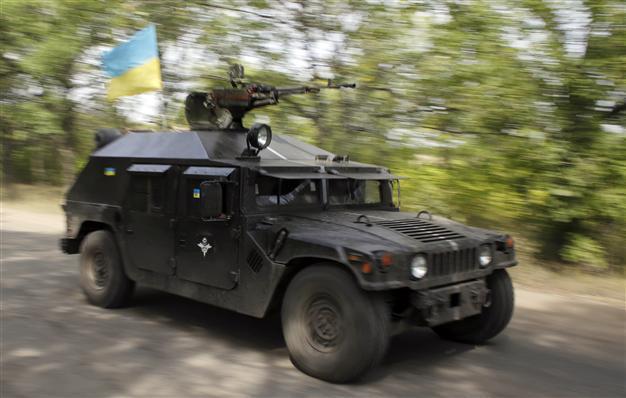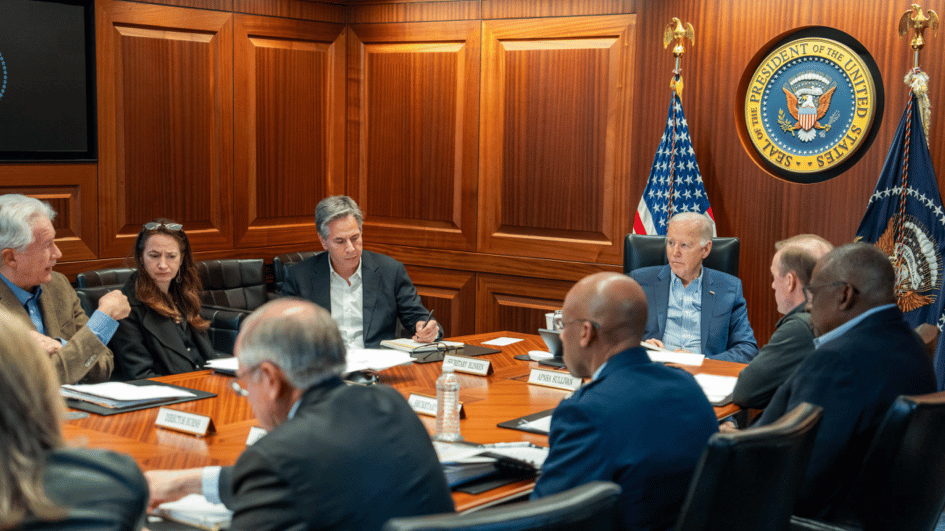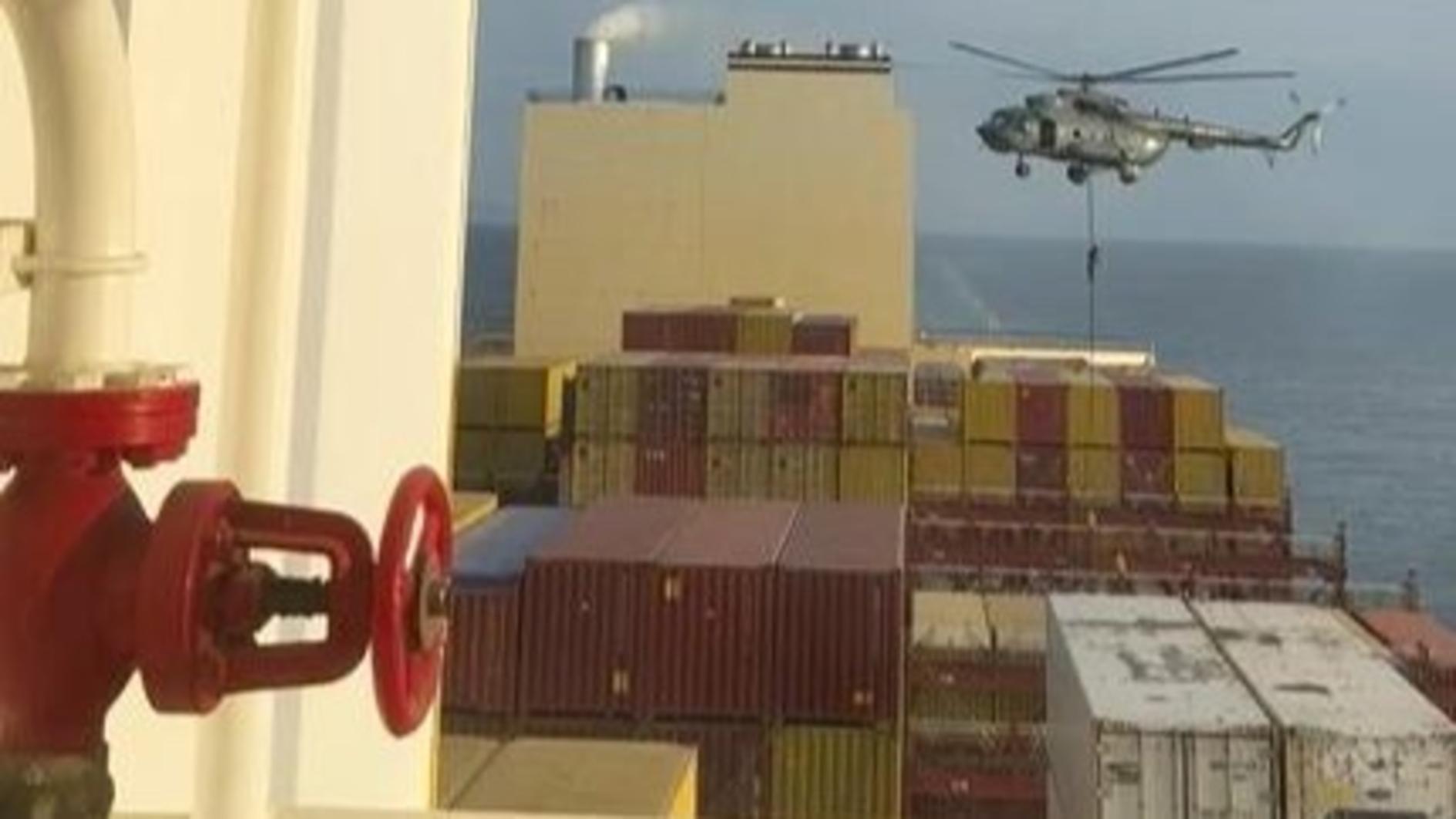Ukraine warns of 'great war' with Russia as its forces retreat
KIEV - Agence France-Presse

Ukrainian soldiers patrol in a APC in the Donetsk area, on Sept. 1. AFP Photo
Ukrainian forces ceded a strategic eastern airport to pro-Russian insurgents on Sept. 1 as the government in Kiev accused Moscow of launching a "great war" that could claim tens of thousands of lives.The sense of foreboding in Kiev came as European-mediated talks over the fast-escalating crisis opened behind closed doors in the Belarussian capital Minsk, attended by government, separatist and Russian envoys.
The rebels have launched a major counter-offensive in recent days that the Ukrainian government and its Western allies claim is backed by Russian forces - a charge Moscow denies.
Ukraine's Defence Minister Valeriy Geletey vowed on Sept. 1 to "immediately mount defences against Russia, which is trying not only to secure positions held by terrorists before but to advance on other territories of Ukraine."
"A great war arrived at our doorstep, the likes of which Europe has not seen since World War II," he wrote on Facebook, warning of "tens of thousands of deaths."
Russian agencies quoted rebel representatives at the Belarus meeting demanding that Kiev provide the separatist regions of Donetsk and Lugansk with a "unique procedure" that would let them integrate closer with Russia.
The developments come a day after Russian President Vladimir Putin said for the first time that the issue of "statehood" should be discussed in talks on the crisis in the east, where fighting has killed more than 2,600 people since mid-April.
Putin accused Europe of ignoring the Ukrainian military's "direct targeting" of civilians in the conflict and said the offensive by insurgents there was simply an attempt to expel Kiev's forces from residential areas.
Incoming EU chief diplomat Italian Foreign Minister Federica Mogherini will on Tuesday outline to the European parliament's foreign affairs committee her view of the Ukraine crisis along with other international issues.
Russian tank battalion forces retreat
On the ground, Kiev said its forces south of the rebel hub of Lugansk were forced to retreat from the local airfield and a nearby village after withstanding artillery fire and fighting a Russian tank battalion.
"There is direct, overt aggression against Ukraine from the neighbouring state," Ukraine's President Petro Poroshenko said.
The retreat marked the latest setback for Ukrainian troops, which had been closing in on rebels in Donetsk and Lugansk until about a week ago, when the insurgents opened a new front in the south.
Since then, the rebels' lightning offensive has forced Ukrainian army units to abandon numerous positions to gear up for the defence of the southeast, in particular the strategic port city of Mariupol, which had been peaceful for months after government troops routed the rebels in May.
AFP correspondents said the presence of the Ukrainian army in the region had visibly decreased in recent days.
"The town is being erased off the face of the Earth," said Yelena Proidak, a resident of Petrovske, a town between Donetsk and Lugansk. "There is no normal life here."
On the Azov Sea coast, where the Kiev government still controls Mariupol, a city of half a million people, rocket launchers were used to fire on two Ukrainian patrol boats about five kilometres (three miles) from the shore on Aug. 31. Two border guards from one of the crews went missing, Kiev said.
A senior Ukrainian security official told AFP on condition of anonymity that Russia's goal was to "destabilise (Ukraine) and create a land corridor to Crimea," the Black Sea peninsula annexed by Moscow in March but connected to Russia only by an old and overloaded ferry link.
Kiev and the West have repeatedly accused Russia of direct involvement in Ukraine, with NATO saying last week that Russia had more than 1,000 of its troops deployed in Ukraine and 20,000 massed along the border.
Rights activists in Moscow told AFP that up to 15,000 Russian soldiers had been sent across the Ukrainian border over the past two months.
NATO vows bigger presence
NATO chief Anders Fogh Rasmussen said ahead of the Western military alliance's two-day summit in Wales that opens on Sept. 4 that the growing Russian threat meant the Cold War-era bloc must create a bigger presence in eastern Europe.
"We must face the reality that Russia... considers NATO an adversary," he told reporters. "We cannot afford to be naive."
Kiev has asked NATO for help and Poroshenko is expected to travel to Wales and meet with U.S. President Barack Obama.
Russia has repeatedly denied helping the insurgency, with Foreign Minister Sergei Lavrov declaring on Sept. 1 that "there will be no military intervention (in Ukraine)."
The European Union warned Moscow on Aug. 31 that it would slap it with fresh sanctions unless it reversed course in the crisis within a week.
Putin responded on Sept. 1 by saying that he hoped "common sense will prevail" and urged the bloc to "work together normally" with Moscow.
However the same day German President Joachim Gauck said Russia had "effectively severed its partnership" with Europe and wanted to establish a new order.
















